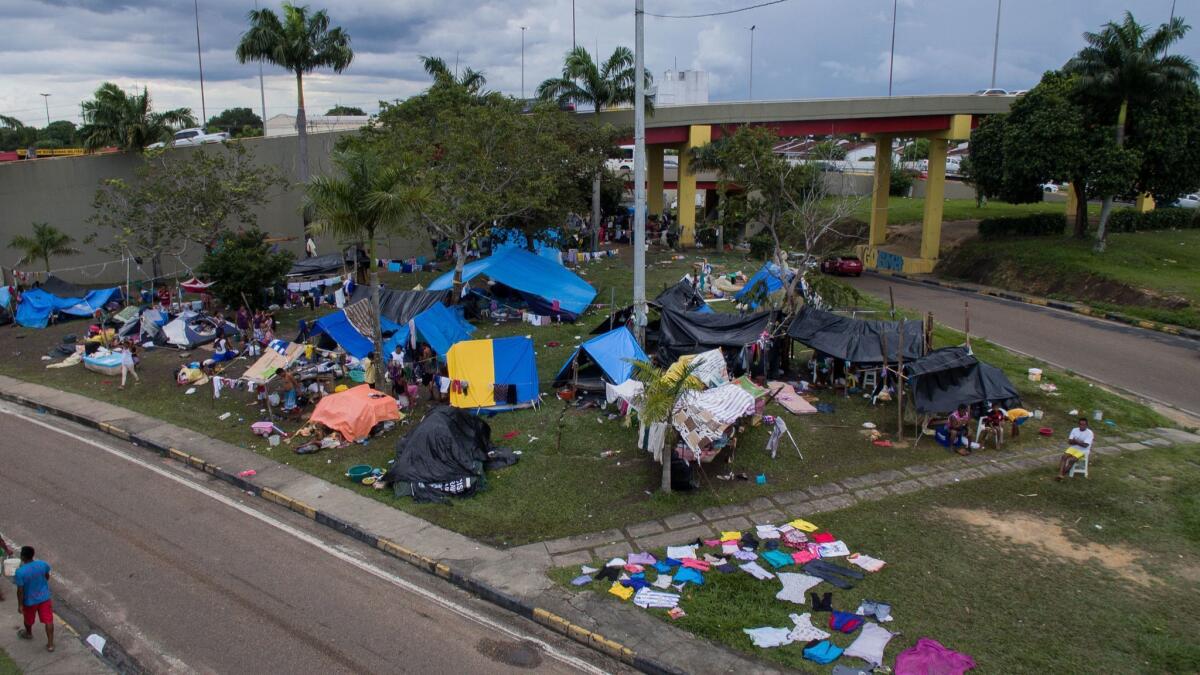Health emergency declared in northern Brazil after measles outbreak

- Share via
Reporting from SÃO PAULO, Brazil — Five days after a 7-month-old boy died in late June from complications related to measles, the mayor of Manaus, the capital city of northern Brazilian state Amazonas, declared a state of emergency.
Residents weren’t coming out in the numbers the city had expected since launching its vaccination campaign four months prior, and it had reached just 85% of its goal of 191,585 MMR inoculations, which protect against measles, mumps and rubella. With 317 cases of measles already confirmed and another 2,225 awaiting confirmation from laboratories, the city knew it had to move quickly.
Some 120 public health agents had already been going door to door since March to vaccinate people in their homes. They also set up immunization centers in public spaces such as day care facilities, schools and shopping malls in an attempt to make it easier for busy working parents to vaccinate their children. Though the first dose of the MMR vaccine is meant to be given at 12 months, the campaign was directed at residents of Manaus as old as 49. The municipal secretary of health now plans to send out another 140 agents in order to reach all of the city’s unvaccinated population.
The World Health Organization declared the Americas measles-free in 2016, but outbreaks can still happen when the disease is brought in by visitors. In the case of Amazonas and neighboring state Roraima, where 200 cases have been confirmed—including two deaths in March—and another 179 are being investigated, it was the large number of Venezuelans fleeing hunger, lack of medical care and violence by crossing the border into northern Brazil that was the tipping point. Last year, some 40,000 Venezuelans sought refuge in Brazil, and another 16,000 have already crossed the border into Roraima in the first six months of this year alone.
According to the Oswaldo Cruz Institute, which carries out biological research and development in Brazil, samples taken from measles patients in Roraima, the most common place to cross the border, are from the D8 genotype, the same one that is currently circulating in Venezuela.
Though the Ministry of Health says municipalities attempt to inoculate all Venezuelans coming into the country, reaching them can sometimes be difficult.
“We have vaccination stations that work regularly to guarantee that the population that enters the country by crossing at proper border checkpoints is vaccinated” against all diseases, said Carla Domingues, coordinator of the National Immunization Program. “But we have to remember that Brazil has an enormous dry border and that not everybody will necessarily enter the country via regulated checkpoints.”
Measles may have entered the country with Venezuelan migrants, but it was the low number of vaccinated Brazilians that helped the disease spread. According to a study conducted by Brazilian newspaper Folha de S.Paulo with data from the National Immunization Program, 1 in 4 cities in Brazil didn’t reach its goal for childhood vaccines last year. When people hear a disease has been eradicated, Domingues says, they tend to forego the vaccination meant to combat it, considering it unnecessary. Now, another 10 cases of measles have been confirmed in four other states: six in Rio Grande do Sul, two in Rio de Janeiro, and one each in São Paulo and Rondônia.
Though so-called anti-vaxxers do exist in Brazil, they aren’t the biggest obstacle the government faces when trying to combat the spread of disease through immunizations. False information disseminated by way of social media, most often in written and audio messages posted on Facebook and the popular messaging app WhatsApp, is what causes the most harm to the country’s vaccination campaigns.
In 2016, when Brazil faced an outbreak of zika, a mosquito-borne virus thought to be linked to neurological disorders like microcephaly, messages started to circulate on WhatsApp saying vaccinations against measles and whooping cough were the real cause of microcephaly.
Earlier this year, a post on Facebook claiming a teenager died because of side effects from the yellow fever vaccine went viral, despite officials from the town where she lived saying the teen’s death was due to bacterial pneumonia. An audio recording of a woman claiming to be a doctor and warning that the vaccine isn’t safe also made the rounds on WhatsApp.
Fighting misinformation online can be an uphill battle, but it’s one the government and healthcare professionals still think they can win by educating the public. Domingues says the Ministry of Health actively uses its own social media channels to give people the proper information they need about vaccines and to try to stop rumors. The country’s next national vaccination campaign will take place in August, this time focusing on measles and polio.
“We just have to keep monitoring” the situation, Domingues said. “Any disease that has low vaccination coverage can be a risk.”
Langlois is a special correspondent for The Times.
More to Read
Sign up for Essential California
The most important California stories and recommendations in your inbox every morning.
You may occasionally receive promotional content from the Los Angeles Times.













